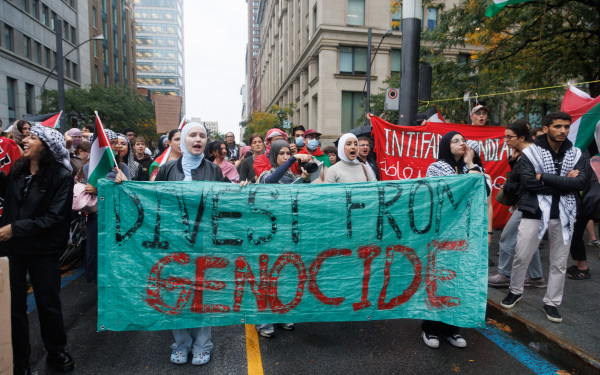Editorial : Cops need to stay off campus
Concordia University is not one to avoid calling the SPVM on its own students.
In the past year, we have seen an unmissable increase in Concordia Safety and Prevention Services (CSPS) officers and cop cars patrolling the Sir George Williams campus on a regular basis.
Since the start of the Fall 2024 semester, and especially during pro-Palestine events, security presence has felt invasive around students and protesters while police patrol the streets. Not only does this intimidate students, but it also imposes a sense of insecurity and increases tensions on campus.
On Sept. 25, an autonomous pro-Palestine student walkout saw police officers arresting three students who were protesting for an immediate end to the genocide in Palestine. Those three students were brutally apprehended by the SPVM, who Concordia had called to the scene.
One of the students, a 20-year-old man, was detained by four CSPS officers who were twisting his arm while they waited for police to arrive. According to the university, the student was stopped by CSPS for vandalizing the university and detained for allegedly assaulting a CSPS officer. After arriving on the scene, police officers threw two other students down on the ground with extreme force and knelt on two other students before arresting them despite their cooperation.
Similar heavy police presence was later seen on Oct. 7, when several student groups organized a walkout that began at Concordia and ended at McGill University, where over 100 SPVM and SQ officers were surveilling students. The protest ended with police deploying tear gas on several protesters, students and even various members of The Link’s staff and masthead.
Unremitting police surveillance and police brutality is unacceptable anywhere.
Increased policing continues to make students feel unsafe on campus, obliging them to remain silent about issues they feel strongly about—evident in the recent pro-Palestine demonstrations.
Two of the students who were arrested were allegedly later suspended and barred from entering Concordia indefinitely. They were not given the right to a tribunal, which is standard protocol at the university.
Student group Concordia Against Tribunals published an open letter asking students to pressure the university to restore the students’ status, limit police presence on campus and encourage the use of de-escalation techniques.
The Link urges students to sign this open letter and advocates for the university to severely limit police presence on campus.
Concordia has always prided itself as a university that values people's beliefs and allows students the freedom to express their own ideas. Given the university’s actions thus far, these values are but empty promises professed for the sole goal of optics.
Concordia proves it does not care for its students, for if it did, it would listen.
It would listen to students who are calling for the university to divest from companies complicit in genocide. It would listen when students ask for ethical and affordable food providers that aren't Aramark. It would listen to Black students who speak out about feeling targeted on campus. It would listen to the thousands of students who were fighting against the tuition hikes and it would listen to students asking for less security on campus.
But the university is turning a blind eye to all these issues, and not for the first time.
Concordia has a history of allowing cops on campus.
Most notably, in 1969, Concordia—then Sir George Williams University—saw student demonstrators throwing computers out of the ninth-floor window. They were protesting biology professor Perry Anderson—who systematically awarded unfairly low or failing grades to Black and Caribbean students—as well as the university’s subsequent mishandling of student complaints against him.
A fire broke out in the computer lab, police officers unleashed violence on protesters and 97 students were arrested. Eighteen-year-old Coralee Hutchison suffered head trauma inflicted by police and died of a brain aneurysm shortly after. Her parents believe it was due to police violence.
The 2002 Netanyahu riots are another prime example of Concordia using police force against its students. At the time, Hillel Concordia, an Israeli group on campus, had invited Israeli Prime Minister Benjamin Netanyahu to speak at Concordia. Protests amassed opposing the event.
A confrontation escalated; two windows were smashed on the ground floor of the Henry F. Hall building and the university called the police, who diffused pepper spray into the crowd.
We see that same repression towards students and over-reliance on police to date, with windows being smashed again in frustration. The university would rather hide behind the SPVM than talk to its students to ensure their safety.
The student movement has and always will be on the right side of history. It is up to Concordia to choose a side too.
This article originally appeared in Volume 45, Issue 4, published October 22, 2024.







